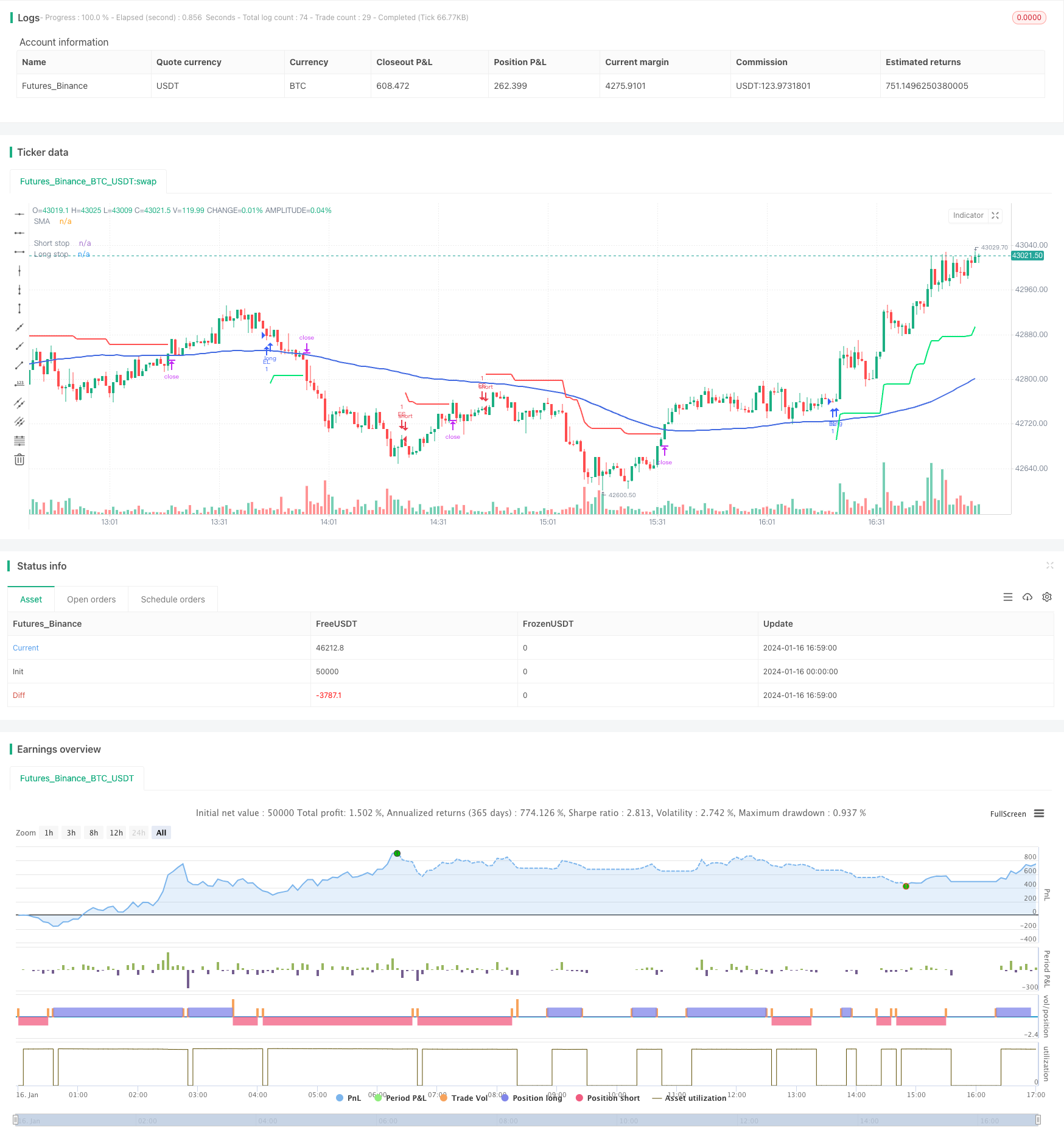Name
基于SMA和ATR的趋势追踪策略SMA-and-ATR-Based-Trend-Tracking-Strategy
Author
ChaoZhang
Strategy Description
本策略名称为基于SMA和ATR的趋势追踪策略。
本策略利用SMA指标判断价格趋势方向,并利用ATR指标设置止损位置来追踪趋势。当价格跌破上升趋势时做空,当价格突破下跌趋势时做多,实现趋势交易。
(1)当收盘价上涨且高于SMA时,做多 (2)当收盘价下跌且低于SMA时,做空
利用ATR指标的数值乘以设置的止损倍数作为止损位置。
每根K线收盘后检查止损位置,并更新为更靠近当前价位的止损值。
价格触碰止损线后主动止损退出。
利用ATR指标的动态止损设定能够实现对趋势的自动追踪。
严格的止损规则有助于控制单笔交易的最大回撤。
只有3个参数,方便调整和优化。
如果止损倍数设置过大,可能导致止损位置过于宽松,从而增加回撤。
价格出现假突破时,可能导致错开趋势方向,应结合其他指标过滤信号。
过度依赖参数优化可能导致曲线优化。应谨慎评估参数稳定性。
可以测试其他型的止损算法,如移动止损、比例止损等。
可以加入其他指标过滤假突破。例如增加成交量条件等。
通过历史回测评估参数对不同品种和周期的适应性。
本策略整体思路清晰,通过SMA判断趋势方向,并利用ATR进行趋势追踪,回撤控制能力良好,适合中长线趋势交易。但实盘中仍需要适当调整参数,并防范过优化的风险。
||
The strategy is named SMA and ATR Based Trend Tracking Strategy.
This strategy uses the SMA indicator to determine the price trend direction and sets stop loss positions with the ATR indicator to track the trend. It goes short when the price breaks down an uptrend and goes long when the price breaks through a downtrend to implement trend trading.
(1) Go long when the close price rises and is higher than SMA.
(2) Go short when the close price falls and is lower than SMA.
Use the ATR indicator's value multiplied by the set stop loss multiple as the stop loss position.
After each bar's close, check the stop loss position and update it to a stop loss value closer to the current price.
Actively stop loss when price touches stop loss line.
The dynamic stop loss setting of the ATR indicator enables automatic tracking of trends.
Strict stop loss rules help control maximum drawdown per trade.
Only 3 parameters make adjustment and optimization easy.
If the stop loss multiple is set too high, the stop loss position may be too loose, thus increasing drawdown.
Price false breakouts may lead to missing the trend direction. Other indicators should be used to filter signals.
Excessive reliance on parameter optimization may lead to curve fitting. The stability of parameters should be carefully evaluated.
Other types of stop loss algorithms can be tested, such as moving stop loss, proportional stop loss, etc.
Other indicators can be added to filter false breakouts. For example, adding trading volume conditions.
Back-testing history to evaluate parameters' adaptability to different products and timeframes.
The overall idea of this strategy is clear. It judges trend direction through SMA and uses ATR to track trends with good drawdown control. It is suitable for medium-long term trend trading. But parameters still need proper adjustment in live trading, and risks of over-optimization should be prevented.
[/trans]
Strategy Arguments
| Argument | Default | Description |
|---|---|---|
| v_input_int_1 | 100 | SMA Length |
| v_input_int_2 | 10 | ATR Length |
| v_input_float_1 | 4 | Stop Offset Multiple |
Source (PineScript)
/*backtest
start: 2024-01-16 00:00:00
end: 2024-01-16 17:00:00
period: 1m
basePeriod: 1m
exchanges: [{"eid":"Futures_Binance","currency":"BTC_USDT"}]
*/
// This Pine Script™ code is subject to the terms of the Mozilla Public License 2.0 at https://mozilla.org/MPL/2.0/
// © omererkan
//@version=5
strategy(title="SMA with ATR", overlay=true)
smaLen = input.int(100, title="SMA Length")
atrLen = input.int(10, title="ATR Length")
stopOffset = input.float(4, title="Stop Offset Multiple", step=0.25)
smaValue = ta.sma(close, smaLen)
stopValue = ta.atr(atrLen) * stopOffset
lowerCloses = close < close[1] and
close[1] < close[2] and
close[2] < close[3]
enterLong = close > smaValue and
lowerCloses
longStop = 0.0
longStop := if enterLong and strategy.position_size < 1
close - stopValue
else
math.max(close - stopValue, longStop[1])
higherCloses = close > close[1] and
close[1] > close[2] and
close[2] > close[3]
enterShort = close < smaValue and
higherCloses
shortStop = 0.0
shortStop := if enterShort and strategy.position_size > -1
close + stopValue
else
math.min(close + stopValue, shortStop[1])
plot(smaValue, color=#4169e1, linewidth=2, title="SMA")
plot(strategy.position_size > 0 ? longStop : na, color=color.lime,
style=plot.style_linebr, title="Long stop", linewidth=2)
plot(strategy.position_size < 0 ? shortStop : na, color=color.red,
style=plot.style_linebr, title="Short stop", linewidth=2)
if enterLong
strategy.entry("EL", strategy.long)
if enterShort
strategy.entry("ES", strategy.short)
if strategy.position_size > 0
strategy.exit("SL Long", from_entry="EL", stop=longStop)
if strategy.position_size < 0
strategy.exit("SL Short", from_entry="ES", stop=shortStop)
if enterLong
strategy.cancel("Exit Short")
if enterShort
strategy.cancel("Exit Long")
Detail
https://www.fmz.com/strategy/439260
Last Modified
2024-01-18 16:04:51
